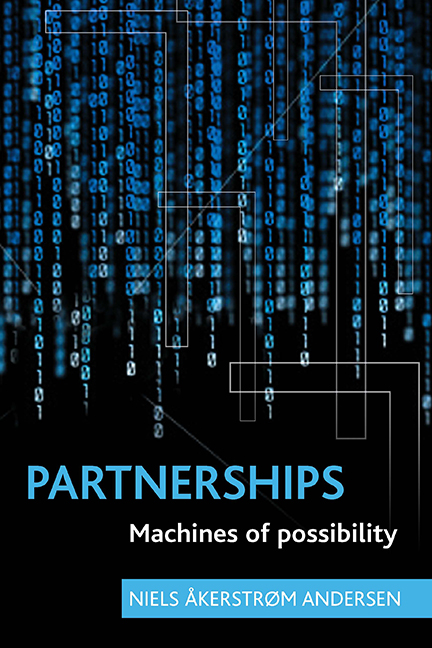Book contents
- Frontmatter
- Contents
- List of tables and figures
- Preface and acknowledgements
- Introduction
- one Analytical strategy
- two Articulating partnerships
- three Outsourcing limits
- four Contracts and relationality
- five Contracts as communication
- six Partnerships as second‑order contracts
- seven Partnerships as tentative structural coupling
- eight Partnerships as second‑order organisations
- Conclusion
- References
- Index
Preface and acknowledgements
Published online by Cambridge University Press: 13 January 2022
- Frontmatter
- Contents
- List of tables and figures
- Preface and acknowledgements
- Introduction
- one Analytical strategy
- two Articulating partnerships
- three Outsourcing limits
- four Contracts and relationality
- five Contracts as communication
- six Partnerships as second‑order contracts
- seven Partnerships as tentative structural coupling
- eight Partnerships as second‑order organisations
- Conclusion
- References
- Index
Summary
Five years ago I began writing a book provisionally entitled The contractualisation of the universal. Its aim was to summarise the many different forms of contractualisation that currently take place in the public sector and that all, in a certain sense, frame the concepts of ‘general’, ‘public’ and ‘common’ within the particular form of the contract.
So I created a heuristic distinction between: individual internal contracts between the administration and administration managers or the administration and employees; individual external contracts between the administration and citizens; internal organisational contracts, for example, the so-called internal contracts between departments; and, finally, organisational contracts established outside the administration, for example, between a private company and an administrative department.
My efforts, however, quickly became sidetracked, so that the external individual contractualisation, which I had considered a minor issue, eventually evolved into an independent book entitled The contractualisation of the citizen, which was published in 2003 (Andersen, 2003a).
Although I am now back on track, once again it has become clear to me that there is more to these contractualisations than I had initially imagined. And once again, a single element of the model (partnerships) has evolved into a book of its own – studying hybrids such as, for example, citizen's contracts or partnerships, came to involve a great number of other issues. Hybrids are phenomena that do not fit into traditional categories and boxes. Deconstruction is typically perceived as a specific research strategy, which seeks out discrepancies and brings impossible relations to light. Hybrids, however, seem to hold in themselves a deconstructive force. They tear at the fundamental building blocks of society, and paradoxes do not impede their efforts. On the contrary, hybrids seem to live off paradoxes. And it is a difficult task to accurately describe this.
This present book is part of a project entitled ‘Negotiated Welfare Regime’, supported by the Danish Council for Research Policy.
I have received much support during the process of writing this book. I presented a draft for discussion with colleagues at the Department of Management, Politics and Philosophy at the Copenhagen Business School and received many constructive comments. The following people, however, deserve special thanks. Gorm Madsen was the student assistant for the project.
- Type
- Chapter
- Information
- PartnershipsMachines of Possibility, pp. vii - viiiPublisher: Bristol University PressPrint publication year: 2008



